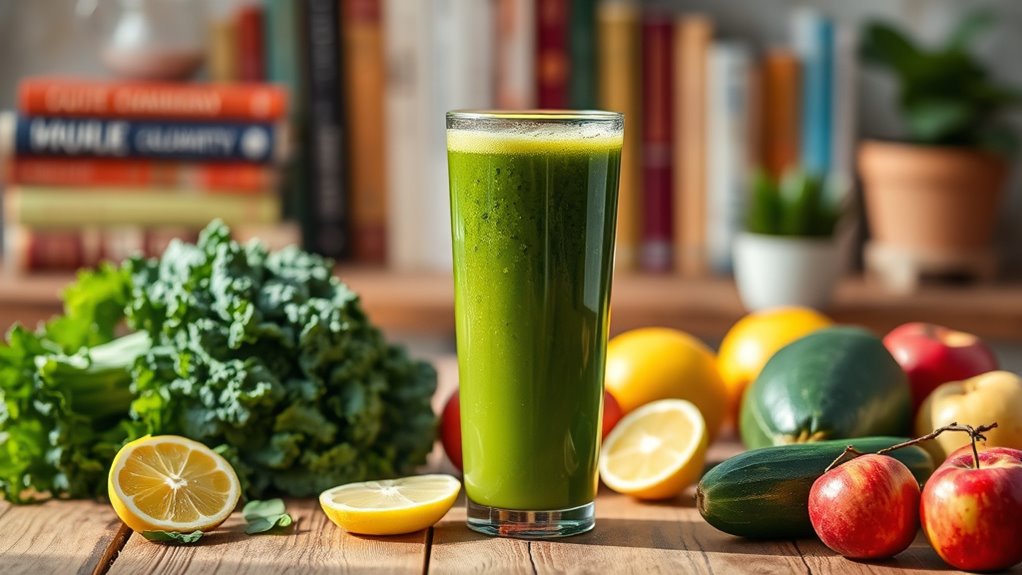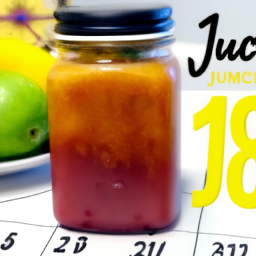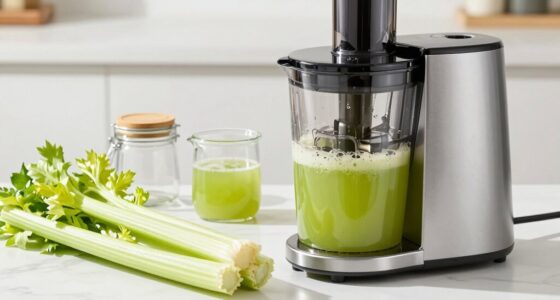Juice cleanses may seem like a quick way to detox and improve gut health, but they can cause more harm than good. They remove fiber, which is essential for digestion and gut bacteria, and can lead to nutritional deficiencies that weaken immunity and energy. Short-term benefits are often outweighed by risks like reduced microbial diversity and nutrient gaps. To support your gut long-term, it’s better to focus on balanced diets and wholesome foods—discover how to do that effectively.
Key Takeaways
- Juice cleanses can temporarily reduce gut microbial diversity, potentially weakening gut resilience and immune function.
- Lack of fiber during cleanses may impair digestion and long-term gut health, as fiber supports beneficial bacteria.
- Short-term detox benefits are limited; prolonged cleanses risk nutritional deficiencies and gut imbalance.
- Including probiotics and fiber-rich ingredients can help mitigate negative effects on gut health.
- Sustainable gut health relies on balanced diets with diverse, nutrient-rich foods rather than extreme juice-only regimens.
What Are Juice Cleanses and How Do They Work?
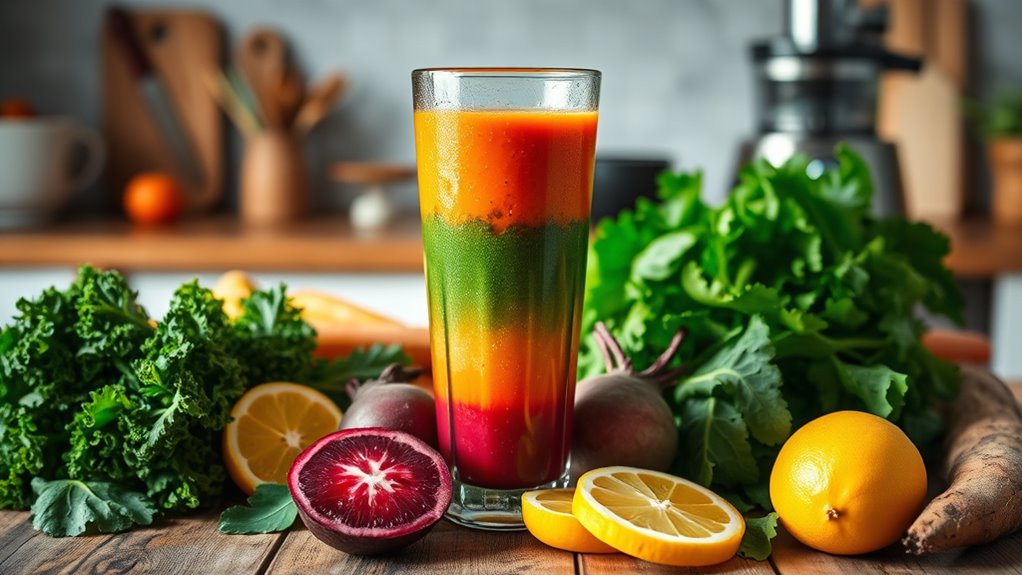
Juice cleanses are short-term diets that involve consuming only fruit and vegetable juices to detoxify the body. During a cleanse, your fiber intake drops markedly since juices contain less fiber than whole fruits and vegetables, which can affect digestion. To support your body, hydration strategies are essential; drinking plenty of water helps flush out toxins and keeps you energized. While juice cleanses aim to provide nutrients quickly, they often lack the fiber that aids digestion and maintains gut health over time. Incorporating mindful space and organization into your routine can also help you better prepare and recover from a cleanse. Proper calibration of your expectations and monitoring your body’s responses can help prevent adverse effects. By focusing on hydration and understanding the impact on fiber intake, you can better prepare for a cleanse and minimize potential side effects. It’s important to remember that prolonged juice cleansing may lead to nutrient deficiencies, so these routines should be undertaken cautiously and ideally under professional guidance. Additionally, understanding the core personality traits involved in health behaviors can help you develop more sustainable wellness routines. Remember, these cleanses are typically temporary and should be approached with caution.
The Short-Term Effects on Digestion and Energy Levels

As you start a juice cleanse, you might notice your energy levels fluctuate throughout the day. Some people feel more tired or irritable, while others experience a quick boost of liveliness. You could also experience digestive discomfort as your body adjusts to the new routine. Embracing failure as a learning opportunity during this process can help you better understand how your body responds to such changes. Paying attention to nutritional balance can support your overall well-being and recovery. Additionally, understanding the importance of skin health and how your body reacts to dietary changes can be beneficial during this period. Incorporating insights about air quality and its impact on overall health can also be helpful, especially when making lifestyle adjustments. Furthermore, considering tuning options for your vehicle can serve as a reminder of how small adjustments can optimize performance and efficiency in various aspects of life.
Energy Fluctuations Often Occur
When you start a juice cleanse, you might notice your energy levels fluctuate unexpectedly. These shifts happen because your body adjusts to new habits, especially with sugar spikes from fruit juices and changes in hydration balance. You may feel bursts of energy followed by crashes, leaving you fatigued. To manage these fluctuations, consider:
- Monitoring your sugar intake to prevent sharp spikes
- Staying consistent with hydration to support energy stability
- Listening to your body’s signals for rest or nourishment
- Recognizing how ECU tuning is essential for developing reliable health-related AI solutions
- Understanding the importance of nutritional balance in maintaining steady energy levels throughout the cleanse
- Being aware that juice spoilage can affect the quality and safety of your intake, potentially impacting your energy levels
- Being mindful of how hydration levels influence overall energy and well-being during the process
These short-term changes can be normal, but they highlight how sensitive your energy levels are during a cleanse. Being mindful of sugar and hydration helps you navigate these fluctuations more smoothly, making the process more manageable and less draining.
Digestive Discomfort Possible
Starting a juice cleanse can lead to temporary digestive discomfort as your body adapts to the increased intake of liquids and concentrated nutrients. You might experience bloating, gas, or irregular bowel movements initially. This discomfort is often linked to fermentation advantages, where your gut bacteria start breaking down the sugars and fibers in the juices. While juice cleanses can reduce fiber intake, some programs include fiber-rich ingredients to support digestion. During this adjustment period, your gut is learning to process fewer solid foods and more liquids, which can cause short-term issues. However, as your body adjusts, fermentation advantages can promote healthy gut bacteria, improving digestion over time. Gut health can be supported by incorporating probiotics and prebiotics into your routine as your digestive system adapts. Incorporating digestive support strategies can help mitigate discomfort and promote a healthier gut environment during this period. Additionally, understanding the impact of fiber on digestion can help you tailor your intake during and after the cleanse to maintain optimal gut function. Recognizing the influence of Bollywood Legends and their wellness routines can inspire holistic health approaches. Incorporating natural fiber sources like fruits and vegetables can also aid in easing the transition back to regular eating habits.
Impact on the Gut Microbiome and Microbial Diversity
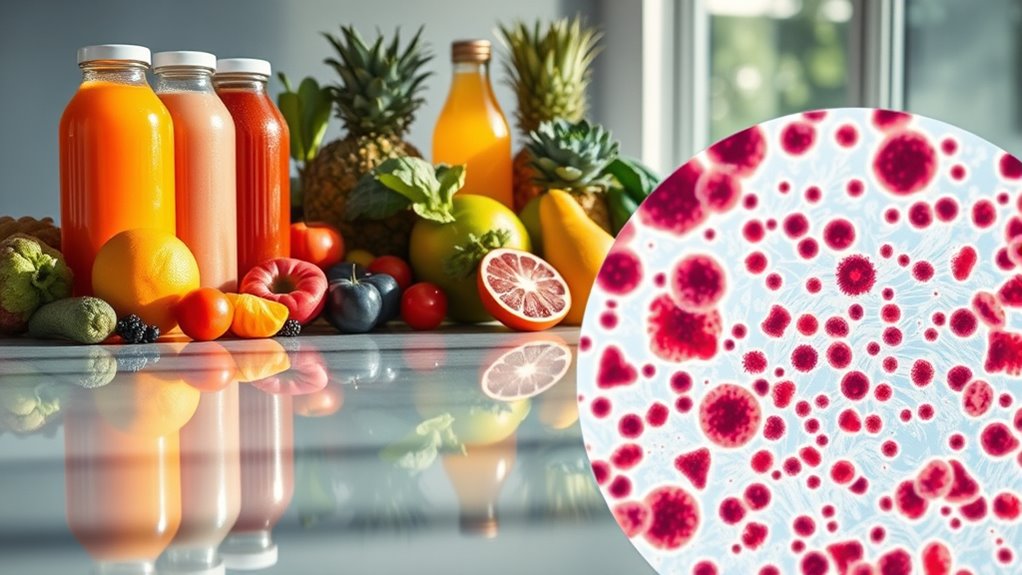
Juice cleanses can substantially influence your gut microbiome by altering the balance and diversity of microbial species. When you switch to a liquid-only diet, you may reduce the variety of bacteria that support digestion and immune function. This can temporarily lower microbial diversity, which is vital for a resilient gut. Reduced diversity may weaken your gut’s ability to adapt to stress and recover from disruptions. To understand these effects, consider how juice cleanses:
Juice cleanses may temporarily lower gut microbial diversity and weaken resilience.
- Disrupt the growth of beneficial bacteria
- Favor certain microbial strains over others
- Potentially decrease gut resilience over time
Maintaining a diverse microbiome is key to overall gut health. While short-term cleanses might not cause lasting harm, prolonged or frequent cleanses could compromise your gut’s ability to stay balanced and resilient against future challenges. Additionally, research indicates that microbial diversity is crucial for immune regulation and metabolic health.
Potential Nutritional Deficiencies and Risks
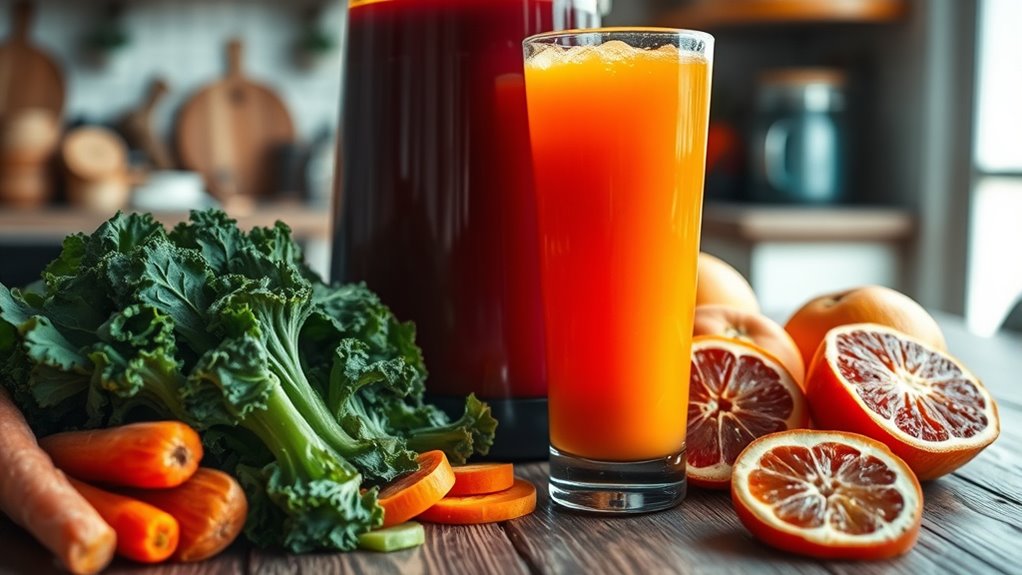
When you rely solely on juices, you risk missing out on essential vitamins and minerals your body needs. This can lead to nutritional gaps and imbalanced eating habits. It’s important to understand these risks before starting a juice cleanse.
Vitamin and Mineral Gaps
Engaging in juice cleanses can lead to significant vitamin and mineral gaps, as these diets often lack the diversity needed to meet your nutritional requirements. Without a balanced intake, you risk vitamin deficiency and mineral imbalance, which can impact your energy and immunity. You might miss essential nutrients like vitamin B12, iron, and calcium, crucial for overall health. To stay on top of your nutrition, be aware of these potential issues:
- Inadequate intake of fat-soluble vitamins (A, D, E, K)
- Low levels of minerals like magnesium and zinc
- Increased risk of deficiencies affecting bone health and immune function
Recognizing these gaps helps you understand why relying solely on juice cleanses can be risky for your long-term health.
Risk of Imbalanced Nutrition
Participating in a juice cleanse can lead to imbalanced nutrition, increasing your risk of developing deficiencies that affect overall health. Relying solely on juice reduces dietary diversity, making it hard to get all essential nutrients. This lack of nutritional balance may cause fatigue, weakened immunity, and other health issues. To highlight potential risks, consider this table:
| Nutrient | Common Deficiency | Impact |
|---|---|---|
| Protein | Yes | Muscle loss, fatigue |
| Fiber | Often lacking | Digestive problems |
| Healthy fats | Rarely present | Brain and hormone health |
| Vitamins & minerals | Inadequate | Immune and energy deficits |
Without proper intake, you risk missing crucial nutrients needed for ideal gut health and overall vitality.
How Juice Cleanses May Influence Inflammation and Immunity
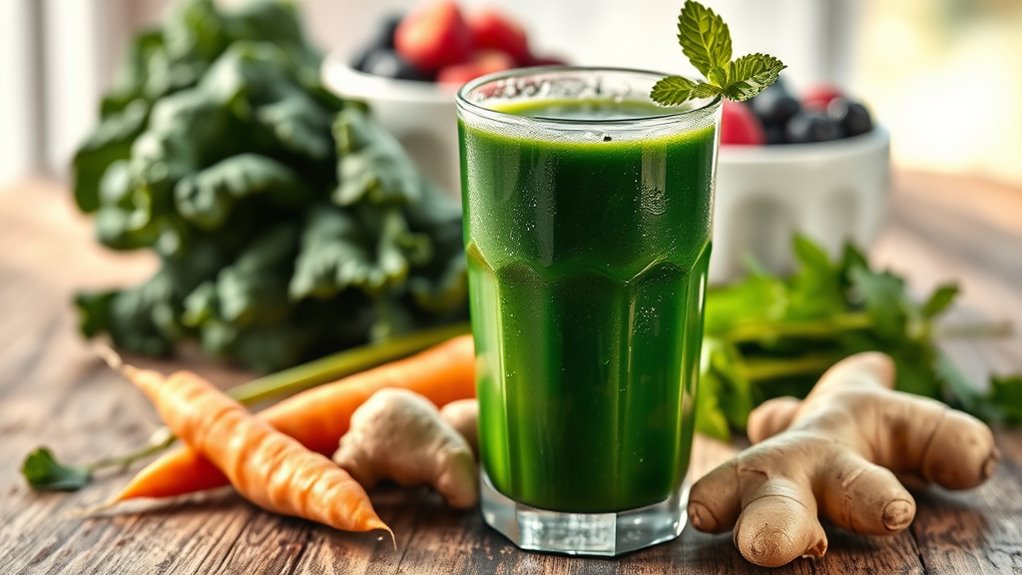
Juice cleanses can potentially impact your body’s inflammation levels and immune response by providing a concentrated dose of antioxidants and phytochemicals. These nutrients may help reduce inflammation, supporting your immune system’s ability to fight off pathogens. Additionally, some juice ingredients promote fermentation benefits, which can enhance microbiome diversity, a key factor in immune health. By supporting a diverse microbiome, you help regulate inflammation and strengthen your gut’s defenses.
- Boost antioxidant intake to combat oxidative stress
- Support fermentation benefits for gut health
- Enhance microbiome diversity to improve immune function
While juice cleanses might temporarily influence inflammation, long-term effects depend on overall diet and lifestyle choices. Keeping your gut healthy is vital for maintaining strong immunity.
Scientific Evidence Supporting or Challenging Juice Cleansing
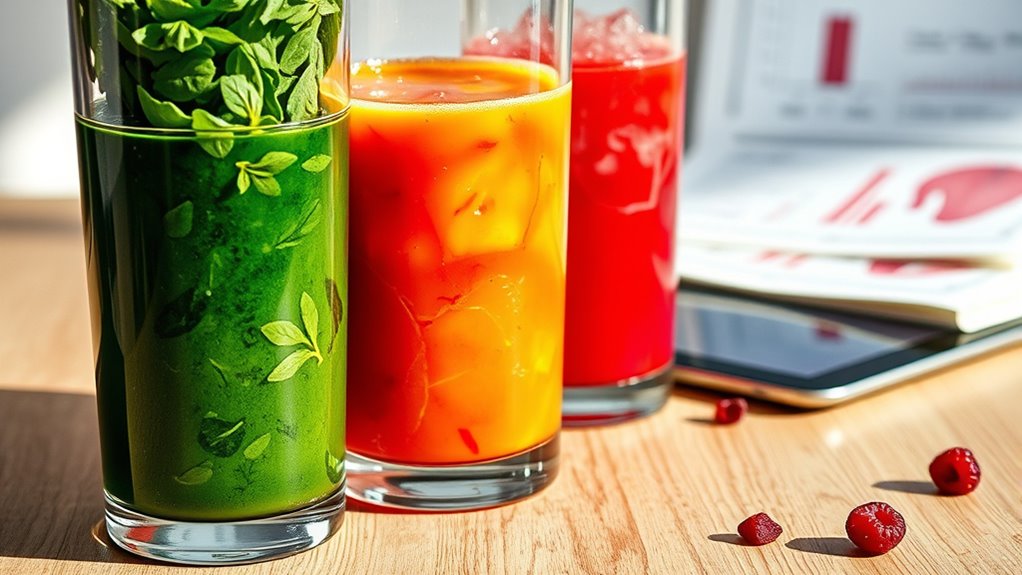
Scientific studies offer mixed results on the effectiveness of juice cleanses, with some research highlighting potential benefits while others raise concerns. Many detox myths suggest juice cleanses can rapidly eliminate toxins, but evidence supporting these claims is limited. Some studies indicate that short-term juice diets may temporarily boost microbiome diversity by introducing beneficial nutrients, yet they don’t prove lasting health improvements. Conversely, other research warns that extreme restrictions can disrupt gut balance or lead to nutrient deficiencies. While some individuals report feeling more energized, scientific evidence remains inconclusive about whether juice cleanses deliver genuine detoxification or long-term gut health benefits. It’s essential to approach these cleanses critically, understanding that the scientific community continues to investigate their true effects.
Long-Term Implications for Gut Health and Overall Wellness
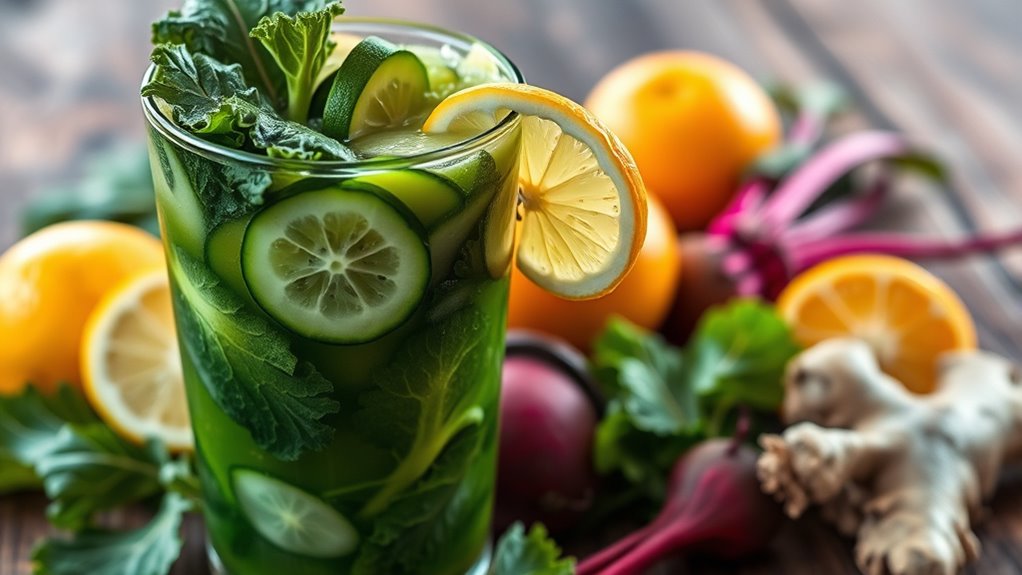
While short-term benefits of juice cleanses can be appealing, their long-term effects on gut health and overall wellness remain uncertain. Continuous use may disrupt your gut’s natural balance, hindering fermentation benefits and gut healing processes. Relying solely on juices can limit fiber intake, essential for maintaining healthy gut bacteria. Over time, this could weaken your digestion and immune response. To support long-term wellness, consider how juice cleanses might:
Juice cleanses may harm gut health over time by disrupting balance and reducing fiber intake.
- Interfere with beneficial fermentation in your gut
- Impair natural gut healing processes
- Reduce fiber, impacting gut microbiota diversity
Maintaining a balanced diet that includes whole foods is key to fostering a resilient gut and promoting sustained wellness. Juice cleanses might offer temporary relief, but they shouldn’t replace sustainable gut health strategies.
Alternatives to Juice Cleanses for Supporting Gut Function
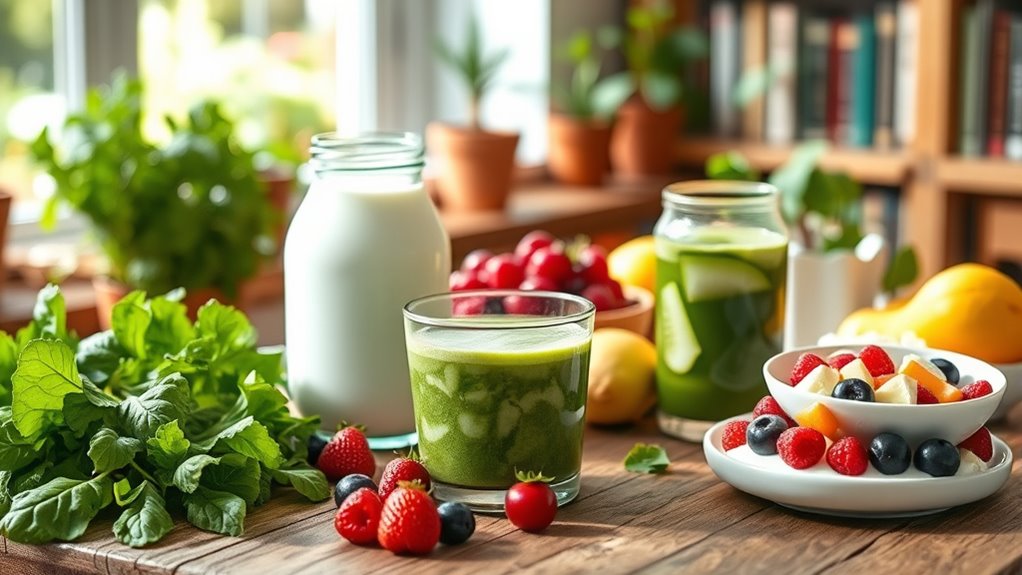
If you want to support your gut health without relying on juice cleanses, there are effective, sustainable alternatives you can incorporate into your routine. Increasing your fiber intake is a simple way to promote healthy digestion and improve gut function. High-fiber foods like vegetables, whole grains, nuts, and seeds help feed beneficial gut bacteria, enhancing fermentation benefits that support a balanced microbiome. Fermentation-rich foods such as yogurt, kefir, sauerkraut, and kimchi also boost gut health by introducing live probiotics, which can improve digestion and strengthen your immune system. These natural approaches are safer and more sustainable than quick-fix cleanses, helping you maintain long-term gut health while supporting overall wellness. Consistency is key to reaping these benefits.
Making Informed Decisions About Detoxing and Gut Care
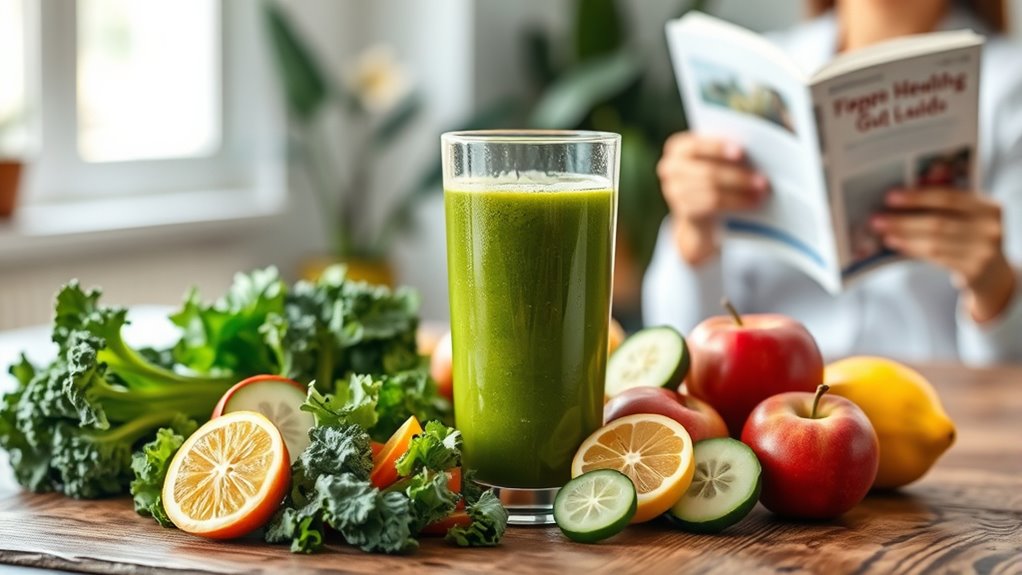
Choosing how to support your gut health requires careful consideration of detox methods and overall care strategies. Be cautious of detox myths that promise quick fixes—your gut recovery takes time and consistent habits. Before jumping into a detox, research thoroughly and consult healthcare professionals. Remember, not all detox routines are safe or effective; some can do more harm than good. To make informed decisions:
- Question the validity of popular detox myths
- Focus on sustainable, evidence-based gut recovery practices
- Avoid extreme or restrictive detox plans that could compromise your health
Understanding that your gut needs gentle, ongoing support helps you avoid unnecessary risks. By staying informed, you empower yourself to choose detox and gut care strategies that truly benefit your health without falling for myths or shortcuts.
Frequently Asked Questions
Can Juice Cleanses Cause Long-Term Harm to Gut Microbiota?
Juice cleanses can cause long-term harm to your gut microbiota by disrupting its balance, known as microbiota disruption. When you rely solely on juices, you might experience nutrient deficiency, especially in fiber and protein, which are essential for healthy gut bacteria. This imbalance can weaken your digestion and immune health over time. To protect your microbiota, consider a balanced diet that includes whole foods alongside occasional cleanses.
Are There Specific Populations That Should Avoid Juice Cleanses?
Did you know that 20% of adults have certain health conditions that make juice cleanse contraindications risky? If you’re pregnant, breastfeeding, or have diabetes, you should avoid juice cleanses because they can cause blood sugar spikes or nutrient imbalances. Vulnerable populations like the elderly or those with immune issues should also avoid. Always consult your healthcare provider before starting any cleanse to ensure it’s safe for you.
How Do Juice Cleanses Compare to Other Detox Methods?
When comparing juice cleanses to other detox methods, you find that many detox myths emphasize quick fixes, but juice cleanses often lack long-term cleanse sustainability. Unlike some detox approaches, juice cleanses focus on liquid nutrition, which may not support sustained health goals. You should consider that other detox methods might offer more balanced, sustainable results, and be cautious about relying solely on juice cleanses for detoxification or health improvements.
What Are the Signs of Adverse Reactions During a Juice Cleanse?
When you’re on a juice cleanse, watch for signs that things might be going south. If you experience digestive discomfort, dizziness, or fatigue, it’s a red flag that your body isn’t handling it well. These symptoms can indicate dehydration or nutrient deficiency. Don’t brush these off—listen to your body, because ignoring warning signs can turn a good idea into a bad situation. Stay alert and prioritize your health.
Can Juice Cleanses Improve Gut Health Beyond Short-Term Effects?
You wonder if juice cleanses can improve gut health beyond short-term effects. While they may temporarily boost your fiber intake and nutrient absorption, long-term benefits are uncertain. Juice cleanses often lack fiber, which is essential for healthy digestion. Relying solely on juices might disrupt your gut microbiome, so it’s better to incorporate a balanced diet rich in whole foods for sustained gut health improvements.
Conclusion
If you’re considering a juice cleanse, remember that your gut needs a variety of nutrients to thrive—not just a quick fix. Studies show that over 60% of your immune system is linked to gut health, so making informed choices matters. Instead of restrictive cleanses, focus on balanced eating and mindful habits. Your gut will thank you, and you’ll feel more energized and resilient in the long run.
